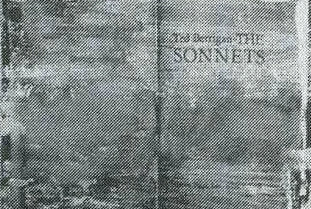 Jasper Johns, "Land's End" (1978)
Jasper Johns, "Land's End" (1978)According to Roberta Bernstein, in Nice to See You: Homage to Ted Berrigan (Coffee House, 1991), "Near the upper left corner of 'Screen Piece 3,' Johns silkscreened the title page and adjoining blank page of a book of poems by Ted Berrigan, The Sonnets (1964) [in the Grove Press edition]. There are many aspects of The Sonnets which would have appealed to Johns at this time, but I think the most important was the way the poems were conceived as a series. They are all written in the sonnet form and certain lines reappear in different poems, sometimes fragmented or slightly altered. Two of the poems, 'Penn Station' and 'Sonnet XXI,' are made up of identical lines rearranged. Johns' Screen Pieces are likewise the same format, and contain motifs which are repeated in each version. Johns was reading The Sonnets in November 1967, when he was beginning work on his Screen Pieces, and I think these poems reaffirmed or possibly inspired the idea of a closely related series of paintings."
Here's that bit from the upper left corner of "Screen Piece 3" (I'm snipping it from a photo of the entire work by Eric Pollitzer, and then rotating it ninety degrees):
Bernstein goes on to talk about the pleasure Johns took in discovering the patterning of The Sonnets. He read her poems from the book and selected favorite lines, some of which she quotes as particularly relevant to his art (and some of which Berrigan borrowed, of course): "Everything turns into writing / I strain to gather my absurdities into a symbol"; "(to cleave to a cast-off emotion--Clarity! Clarity!)"; "I'll break / My staff bury it certain fathoms in the earth / And deeper than did ever plummet sound / I'll drown my book."
She also mentions the wealth of personal and poetic references in The Sonnets and how Berrigan's allusions "to particular poets and poems, even through a name or title only, enabled Johns to bring personal associations and feelings into his own work indirectly through the intermediary of poetry."
Lovely affinities all. But since the initial charge of this blog was to throw light on lives both saved and ruined by poetry, one can't help noticing that these affinities pale a little (or are overshadowed by an element of sadness) when one remembers the economic circumstances in which Berrigan left his family and how they compare to the prices fetched by works like "Screen Print 3" today.
On November 2, 1994, under the headline "At the Auctions," the Washington Post reported the top five prices of recent days, including a work by Jasper Johns which they called "Screenpiece #3 (The Sonnets)."Kvelled the Post, "One of the handful of works offered by publishing magnate S.I. Newhouse, this esoteric canvas is inspired by the New York poetry of Ted Berrigan."
Selling price? A cauterizingly ironic $662,500.










